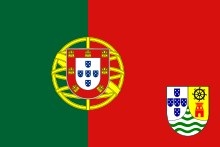Language/Indo-portuguese/Vocabulary/Animals
Hi Indo-Portuguese learners! 😊
In this lesson, we will learn some Indo-Portuguese vocabulary related to animals. We will also include cultural information and interesting facts about these animals. By the end of this lesson, you will be able to confidently talk about animals in Indo-Portuguese. So let's get started! Don't forget to use Vocabulary to improve your language skills, and if you encounter any difficulty, find native speakers and ask them any questions.
Mammals[edit | edit source]
Mammals are a diverse group of animals that includes humans, as well as various wild and domesticated animals. Here are some animals that fall under this category:
Cão[edit | edit source]
Cão (dog) is a popular domesticated animal known for its loyalty and affection towards humans. In Portugal, dogs are considered to be man's best friend. They are even called "companheiros" (companions).
| Indo-Portuguese | Pronunciation | English |
|---|---|---|
| Cão | kowⁿ | Dog |
- Person 1: Eu tenho um cão. (I have a dog)
- Person 2: Que raça é? (What breed is it?)
- Person 1: Ele é um Labrador. (He is a Labrador)
Gato[edit | edit source]
Gato (cat) is another popular domesticated animal. In Portugal, cats are considered to be independent creatures that are affectionate only on their own terms.
| Indo-Portuguese | Pronunciation | English |
|---|---|---|
| Gato | gatⁿ | Cat |
- Person 1: Eu gosto muito de gatos. (I really like cats)
- Person 2: Eu não sou muito fã de gatos. (I am not a big fan of cats)
Cavalo[edit | edit source]
Cavalo (horse) is a large domesticated animal used for transportation, riding, and racing. In Portugal, the Lusitano horse breed is famous for its agility and beauty. Lusitano horses are even protected by law in the country.
| Indo-Portuguese | Pronunciation | English |
|---|---|---|
| Cavalo | kaˈvalu | Horse |
- Person 1: Você já montou em um cavalo? (Have you ever ridden a horse?)
- Person 2: Sim, montei uma vez. Foi incrível! (Yes, I rode once. It was amazing!)
Birds[edit | edit source]
Birds are warm-blooded animals with feathers and beaks. Here are some birds that can be found in Indo-Portuguese-speaking countries:
Galinha[edit | edit source]
Galinha (chicken) is a domesticated bird and a popular source of protein around the world. In Portugal, chicken dishes like "frango churrasco" (grilled chicken) are a staple in many restaurants.
| Indo-Portuguese | Pronunciation | English |
|---|---|---|
| Galinha | ga'ĩɲa | Chicken |
- Person 1: Quer uma coxa de galinha? (Do you want a chicken leg?)
- Person 2: Não, obrigado. Eu não gosto de carne. (No, thank you. I don't eat meat.)
Pato[edit | edit source]
Pato (duck) is a common bird in Portugal and other European countries. In some cultures, duck meat is considered a delicacy.
| Indo-Portuguese | Pronunciation | English |
|---|---|---|
| Pato | patu | Duck |
- Person 1: Você já comeu pato assado? (Have you ever eaten roasted duck?)
- Person 2: Não, nunca experimentei. (No, I have never tried it.)
Insects[edit | edit source]
Insects are small, often winged animals that belong to the arthropod family. Here are some insects that can be found in Indo-Portuguese-speaking countries:
Formiga[edit | edit source]
Formiga (ant) is a common insect found in many parts of the world. In some cultures, ants are even used as food.
| Indo-Portuguese | Pronunciation | English |
|---|---|---|
| Formiga | fuʁˈmiɡa | Ant |
- Person 1: Você já comeu formigas? (Have you ever eaten ants?)
- Person 2: Não, eu jamais comeria formigas. (No, I would never eat ants)
Borboleta[edit | edit source]
Borboleta (butterfly) is a colorful insect with wings that is found in many parts of the world. Portugal has a wide variety of butterfly species, including the rare Apollo butterfly.
| Indo-Portuguese | Pronunciation | English |
|---|---|---|
| Borboleta | boʁboˈlɛtɐ | Butterfly |
- Person 1: Olha, uma borboleta azul! (Look, a blue butterfly!)
- Person 2: Nossa, que linda! (Wow, how beautiful!)
➡ If you have any questions, please ask them in the comments section below.
➡ Feel free to edit this wiki page if you think it can be improved. 😎

